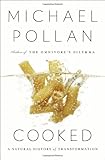Cooked by Michael Pollan
Posted on July 8, 2013 in Books, Food
I was excited for this book because I was a big fan of Pollan’s The Omnivore’s Dilemma. Pollan and I have a similar view and philosophy regarding food. In this book, he explores the history that humans have with four processes of cooking: roasting meat (fire), boiling/braising (water), baking bread (air), and fermentation (earth).
I loved this book at its introduction:
So maybe the reason we like to watch cooking on television and read about cooking in books is that there are things about cooking we really miss. We might not feel we have the time or energy (or the knowledge) to do it ourselves every day, but we’re not prepared to see it disappear from our lives altogether. – p. 5
This is me and my fairly sizeable cookbook collection right now. I use to cook every day; I am not a big fan of leftovers and I love vegetables. I would shop 2-3 times a week for food including at weekend markets. I know how to make my own jam and bread. For reasons I can not go into here, I do not cook now and haven’t for the last couple of years. As a result, what Pollan described above has happened to me: I started buying cookbooks and collecting food shows. I miss cooking and baking a lot.
On capitalism and division of labour economics:
One problem with the division of labor in our complex economy is how it obscures the lines of connection, therefore of responsibility, between our everyday acts and their real-world consequences. Specialization makes it easy to forget about the filth of coal-fired power plant that is lighting this pristine computer screen, or the back beaking labor it took to pick strawberries for my cereal, or the misery of the hog that lived and died so I could enjoy my bacon. Specialization neatly hides our implication in all that is done on our behalf by unknown other specialists half a world away. -p. 21
It’s not even half a world a way sometimes, but there is a movement here in North America where farmers seem to be overlooked or taken for granted.
This all goes back to appreciation and gratitude. I am not particularly religious, but one aspect of Islam that I like is that everything is a miracle. Food that we need to survive is important, but is so is relationship with it. It has shaped our culture and civilization. For thousands of years, food has been largely insecure. Even now, there are major food security issues around the world.
Pollan’s books serve against the battle against fast and mass produced food. As an omnivore like the author, it also says that it’s ethically very difficult to be one in an age of industrial agriculture. It’s an odd mix of wanting to be a vegetarian and wanting to stay an omnivore. It’s difficult (financially or easily) to buy meat now that has had a good life: slow grown and free range. On special occasions, I’ve had free range chicken and it is far superior than standard supermarket chickens, but double the price. As a result, I eat less meat overall.
There is the gender politics of cooking, and the idea that no one cooks because of Women’s Liberation. Pollan posits other ideas, but it is sad to say that no one really cooks anymore and the environment and our health is suffering as a result.
On his section on Bread and Baking, he explained the satisfaction of bread. I love baking. Maybe even more than I love cooking because there really is something almost magical about it. It’s just science with the fermentation, but it’s still amazing.
On the last section of fermentation, he explores the world of microbiology and the importance it has on our own bodies. He also looks at the varying views of those are anti-Pasteur. I think there are definitely interesting things to be made about raw milk cheeses and eating a little dirt now and again. This chapter solidified my quest to make kimchi one day.
I think what I like about Pollan in this book is that he is almost an everyman and he explores many deeply, but he is a journalist as well. He gives various positions about the industrial food industry, slow food movement, home baking, and the rise of fermentation.
There is little doubt that I will buy this book when it comes out on paperback. It even has a few recipes in the appendix. I think if you have an interest in the history of food and cooking and the future of it, this is a great read.
Read July 2-6, 2013.
